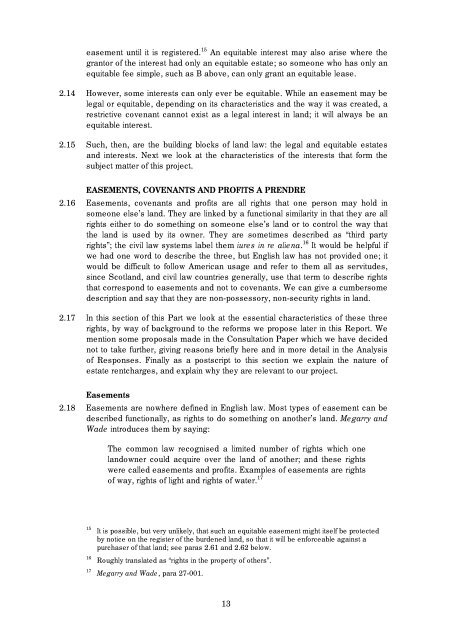Making Land Work: Easements, Covenants and ... - Law Commission
Making Land Work: Easements, Covenants and ... - Law Commission
Making Land Work: Easements, Covenants and ... - Law Commission
You also want an ePaper? Increase the reach of your titles
YUMPU automatically turns print PDFs into web optimized ePapers that Google loves.
easement until it is registered. 15 An equitable interest may also arise where the<br />
grantor of the interest had only an equitable estate; so someone who has only an<br />
equitable fee simple, such as B above, can only grant an equitable lease.<br />
2.14 However, some interests can only ever be equitable. While an easement may be<br />
legal or equitable, depending on its characteristics <strong>and</strong> the way it was created, a<br />
restrictive covenant cannot exist as a legal interest in l<strong>and</strong>; it will always be an<br />
equitable interest.<br />
2.15 Such, then, are the building blocks of l<strong>and</strong> law: the legal <strong>and</strong> equitable estates<br />
<strong>and</strong> interests. Next we look at the characteristics of the interests that form the<br />
subject matter of this project.<br />
EASEMENTS, COVENANTS AND PROFITS A PRENDRE<br />
2.16 <strong>Easements</strong>, covenants <strong>and</strong> profits are all rights that one person may hold in<br />
someone else’s l<strong>and</strong>. They are linked by a functional similarity in that they are all<br />
rights either to do something on someone else’s l<strong>and</strong> or to control the way that<br />
the l<strong>and</strong> is used by its owner. They are sometimes described as “third party<br />
rights”; the civil law systems label them iures in re aliena. 16 It would be helpful if<br />
we had one word to describe the three, but English law has not provided one; it<br />
would be difficult to follow American usage <strong>and</strong> refer to them all as servitudes,<br />
since Scotl<strong>and</strong>, <strong>and</strong> civil law countries generally, use that term to describe rights<br />
that correspond to easements <strong>and</strong> not to covenants. We can give a cumbersome<br />
description <strong>and</strong> say that they are non-possessory, non-security rights in l<strong>and</strong>.<br />
2.17 In this section of this Part we look at the essential characteristics of these three<br />
rights, by way of background to the reforms we propose later in this Report. We<br />
mention some proposals made in the Consultation Paper which we have decided<br />
not to take further, giving reasons briefly here <strong>and</strong> in more detail in the Analysis<br />
of Responses. Finally as a postscript to this section we explain the nature of<br />
estate rentcharges, <strong>and</strong> explain why they are relevant to our project.<br />
<strong>Easements</strong><br />
2.18 <strong>Easements</strong> are nowhere defined in English law. Most types of easement can be<br />
described functionally, as rights to do something on another’s l<strong>and</strong>. Megarry <strong>and</strong><br />
Wade introduces them by saying:<br />
The common law recognised a limited number of rights which one<br />
l<strong>and</strong>owner could acquire over the l<strong>and</strong> of another; <strong>and</strong> these rights<br />
were called easements <strong>and</strong> profits. Examples of easements are rights<br />
of way, rights of light <strong>and</strong> rights of water. 17<br />
15 It is possible, but very unlikely, that such an equitable easement might itself be protected<br />
by notice on the register of the burdened l<strong>and</strong>, so that it will be enforceable against a<br />
purchaser of that l<strong>and</strong>; see paras 2.61 <strong>and</strong> 2.62 below.<br />
16 Roughly translated as “rights in the property of others”.<br />
17 Megarry <strong>and</strong> Wade, para 27-001.<br />
13
















